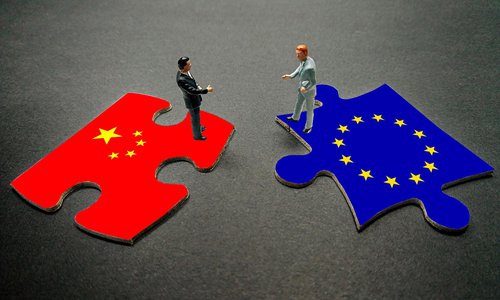HOME >> SOURCE
Global recession threat calls for fresh China-EU coordination mechanism
Source:Global Times Published: 2020/3/9 21:27:44

Photo: IC
A "Black Monday" oil price plunge sent shockwaves through global financial markets, likely the latest manifestation of economic damage from the coronavirus outbreak, as concerns over the global spread of the epidemic precipitated the dramatic failure of OPEC+ talks.
While it is understandable that countries around the world are currently fighting their own battles, facing disruptions to supply chains and financial market turmoil, more economic harm could be caused without global cooperation and coordination due to conflicts of interests.
Although the epidemic in China has been largely reined in, global coronavirus cases continued to rise, exceeding 100,000 over the weekend and spreading to more than 100 countries and regions. As more countries become embroiled in the outbreak, the global economy has been thrown into fears of recession amid further disruptions to supply chains. Last week, the Organisation for Economic Co-operation and Development (OECD) lowered its global GDP forecast by half a percentage point to 2.4 percent for 2020, the lowest since the 2008 financial crisis. It also warned that an escalation of the epidemic could plunge Japan and the eurozone into recession.
China and the EU are currently set to embrace new opportunities in the development of their relations, with a series of important cooperative plans on their agendas including the bilateral investment treaty. The two economies account for about 38 percent of the world's GDP. So whether it is in terms of the need to fight against the virus or in terms of economic interests, it is necessary for China and the EU to establish some kind of temporary coordination mechanism to strengthen their cooperation on epidemic control and minimizing impact on trade.
On the one hand, China and the EU can strengthen communication and the exchange of related epidemic information and medical control measures. At present, the virus is spreading rapidly in many European countries. Italy saw its number of coronavirus cases soar past that of South Korea over the weekend, making it the worst affected country after China. As the first to deal with the outbreak, China has made initial progress in fighting the virus and it can share information and experience with the EU to help the region with its current difficulties.
On the other hand, though the epidemic will inevitably inflict pains on the global economy, both sides can still work together to soften the blow by ensuring their normal trade activities. Coordination could be carried out to address difficulties in supply chains, logistics and relevant trade issues.
In an increasingly globalized world, no country or region can stand alone and keep its economy intact during the deepening coronavirus crisis. We hope a China-EU coordination mechanism could also serve as a model to guide countries in making joint efforts to combat the virus and safeguard normal economic exchanges.
Posted in: GT VOICE